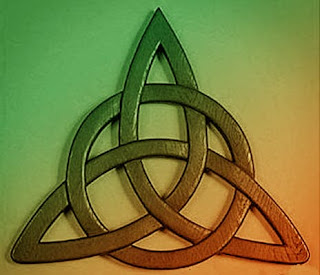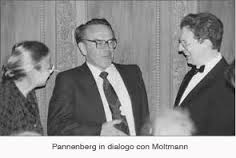A Personal Trinitarian Statement
*Trinitarian Statement
Athanasius, Basil, Gregory of Nazianzus, Gregory of Nyssa, Augustine, and John of Damascus were among those who urged church councils to adopt a set of beliefs regarding God, Christology, and the Holy Spirit. They would present their beliefs in concise, summary form. These figures are representatives of the systematic thrust of Nicene trinitarian theology in relation to other aspects of Christian faith.
I thought I would put my mind to the same task. Such a contemporary appropriation of the meaning of trinitarian doctrine is to admit to the unavoidable “fusion of horizons” that attends every act of interpretation.
Christian theology builds upon the ambiguous human experience of the divine, the sense that our finite and temporal lives connect to something much larger, and we are accountable for the lives we lead.
The Trinity is the way Christians identify God. This doctrine seeks a glimpse into the inner life of God, even though God is beyond our comprehension. God is Infinite and Eternal, meaning that God is present in every place and in every moment, giving God intimate knowledge of every place and every moment. The Infinite and Eternal essence of God means that the energy, grace, and presence of God is a reality for every finite and temporal thing. Yet, the Infinite cannot enter a relationship with the finite without becoming finite; thus, the infinite must embrace the finite (Hegel). This suggests that God as the absolute Power of Being must be an activity shared between God and creature without undermining the ontological difference between them. We can think of the Trinity as the force-field proper to the divine persons as one exemplar of an analogous concept to that of “substance” in classical metaphysics, a generic concept denoting something that endures with a given structure in a world marked by constant change. The divine persons are interrelated lower-order person-making processes that co-constitute a single higher-order process that is constitutive of their life together as divine community. This higher-order process or system proper to the divine persons serves both as the transcendent origin and the goal of the cosmic process since it is a dynamic unity-in-trinity. This means the Trinity becomes an illustration of a philosophical paradigm for the complex relation between the One and the Many at various levels of existence and activity within reality.[1] A person is one whom other persons may address in hopes of response. Christian speech to God is an address to the Father, with the Son, and in the Spirit. We stand before the Father, speaking in community with the Son, and are impelled by the Spirit. The mark of deity is endless futurity. The divine essence keeps things moving forward to an open future in a way that transcends past conditions and remains open to newness. The essence (οὐσία) of God is energy and movement. The Father has always generated the Son and the life-giving gift of the Spirit has always proceeded from the Father. The Spirit as an identity or a person, is the love between Father and the Son, liberating Father and Son to love each other, presenting the Son to the Father as an object of the love that generated the Son, while the Son adores the Father and the Spirit shows the Father as the available and loveable Father. The Spirit stands at the end of all the ways of God because the Spirit is the end of all the ways of God. The Spirit is the liveliness of the divine life because the Spirit is the power of the divine future. The Spirit is the one who, when the Spirit in time gives a down payment on the rule of God, gives the gift of the personal presence of the Spirit. The Spirit is the love into which all things will at the last be brought, who is thus the fulfillment not only of created life but the divine life. Thus, the goal of the divine activity is toward the presence and power of the Spirit. In this way, the presence and power of the Spirit, as transforming and life-giving, within finite and temporal life, means the Spirit is the destiny of the Trinity and of the creative work of the Father and the reconciling work of the Son. [2]
Therefore, the inner life of God always included humanity and the finite and temporal world from which humanity would emerge. The Father was always moving outward toward all that the Son and Spirit embrace about our world. The Spirit renders shareable the Father-Son relation to bring about creation of finite-temporal things. The ordained rule of human beings over creation serves the rule of God in this world, and thus not self-serving and self-destructive ends. The three as ὑ πόστασις have always self-distinguished themselves from each other, recognizing that in distinguishing oneself from another defines oneself as also dependent upon that other. The essence of God is the loving embrace of this mutual relationship and dependence upon each other. The Father, through the Son and Spirit, has brought finitude, temporality, and therefore suffering, into the inner life of God, having done so eternally. Suffering, being the open would in the life of the world, will find healing only in the arrival of future of God.[3]
What Christians say about the essence of God has its basis in revelation witnessed to in scripture. The trinitarian form of the relation of God to us, its interiority and relatedness, reflects the trinitarian being of God. The self-revelation of God enables us to refer our being and activity, our knowing and loving. To Father, Son, and Holy Spirit. The Old Testament movement toward the affirmation of faith in the one of us all, confronting the enemy of death, the acceptance of an exclusive covenant with Yahweh that forms a relationship of Parent to child, establishing the calling to be servant of the Lord as a witness in the world, the presence of the Lord (Glory, Word, Spirit) as a power that moves persons and communities toward their divinely appointed destiny. This future that moves a story must be available within the story. In the scripture this occurs by God making promises, which makes history open to newness. The divine promise to the Patriarchs, to Moses and the Israelites, and to David, will find fulfillment in the exilic calling to Israel to be holy, devoted to the Lord, to be a royal people, to be a servant of the Lord witnessing to the nations. The Torah becoming an obstruction to the witness of these people, the promises would find fulfillment in the life and ministry of Jesus of Nazareth. The event of the Jewish teacher and prophet Jesus of Nazareth is the heart of this revelation. What some would say is impossible, the humbling of divinity to embrace a human being in his finitude, temporality, suffering, and death, Christianity proclaims as good news for the world. Raised by Jewish parents, Mary and Joseph, raised in the humble setting of Nazareth and distant from Jewish political and religious authority in Jerusalem and Roman political and economic authority in Rome, he received baptism by John the Baptist, taught using the humble form of parable and aphorism rather than the exalted form of learned discourse, and performed healings and exorcisms. Jesus lived a Spirit-filled life and ministry, led a life faithful to the Shema of Israel and the Jewish people, faithful to a loving embrace of the neighbor, and faithful to the proclamation to the rule of God. He lived out of an intimate relationship with his Father and invited others to participate in that relationship, and he proclaimed the arrival of the coming rule of God in his ministry. In the gathering of the Twelve he united himself with the continuing history of Israel. As the word and deed of Jesus reveal the significance of his person, so the Pauline gospel focused as well upon the significance of Jesus as the promised Messiah of Israel.[4] The Son or Word of the Father, in this event that embraces finitude, temporality, suffering, and death, is revealing what it is to be God and determines the nature of divine infinity and eternity. Jesus of Nazareth is the Incarnation of the Son. As the Triune God is a communion within divine life, so is the life of Jesus an intimate communion of the divine and human. While differing in gender, race, and economic settings, what makes us human transcends such differences, making the incarnation of the Son of saving significance for all persons. The oneness of the divine essence has a parallel in the oneness of human essence. The self-actualizing of divine life within the relations of the Trinity has a parallel in the actualization of a human life in relation to others. Despite sin and suffering in this world, the Father lovingly embraces this world and finds it worthy of reconciliation and redemption. The event of Incarnation discloses the enslavement of humanity by sin. The cross reveals the extent of the love of God for humanity, bringing forgiveness of sin. He surrendered to the will of the Father by enduring the suffering and shame of the cross in his death for others and for their sin, but also received exaltation by the gift of life through the life-giving power of the Holy Spirit, being raised into the coming glory of the Father.
Those who turn toward this event live their lives in Christ and Christ lives in them, through the life-giving power of the Spirit. The Holy Spirit gathers a people called the church who place their faith in the truth of the revelation of God in Jesus Christ, thereby experiencing justification with God, builds them up in love toward God and their neighbor, thereby experiencing sanctification through the Spirit, and enlivens them to a life of hope, thereby living with a meaningful vocation. They can live in reconciliation with God and with their world. Involvement in the saving work of God in this world involves repairing our relation to persons and to the world. They honor the disciples and other saints, leaders, and teachers of the church throughout its history. The focus of this life is no longer inner-directed but directed outward, under the power of the Spirit, toward faithfully embodying the truth of the event of revelation through prayer and meditation upon the biblical witness, especially in living the Lord’s Prayer, in love toward God and neighbor, in the Ten Commandments, the vice-virtue lists in the New Testament, and leading a faithful, loving, and hope-filled life. In this way, embracing the truth expressed in the doctrine of the Trinity by faith will not be an abstraction, but engages those who believe it in an ongoing process of transforming love through the Spirit and into the image of the Son. One becomes part of a community united with Christ in his baptism, a symbol of moral cleansing, and in the Supper over which he presides, in communion with Christ and with fellow believers. One can then live with a future that includes the hope of personal and cosmic redemption, in which finitude and temporality will find their completion in the loving embrace of the Trinitarian relation through resurrection into the glory of the Father. Such eschatological hope looks forward to a consummation of this process in the eternal enjoyment of the sight of the Father, Son, and Holy Spirit. In the meantime, Christian existence consists in the project of referring one’s existence toward this sight such that every internal and external act becomes oriented to the love and knowledge of the Triune God.




Comments
Post a Comment